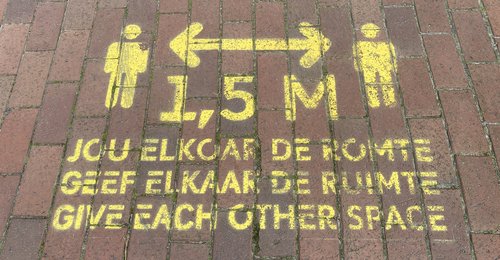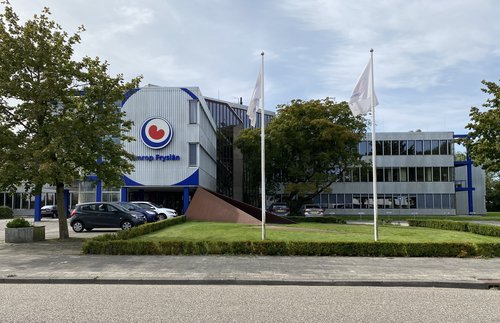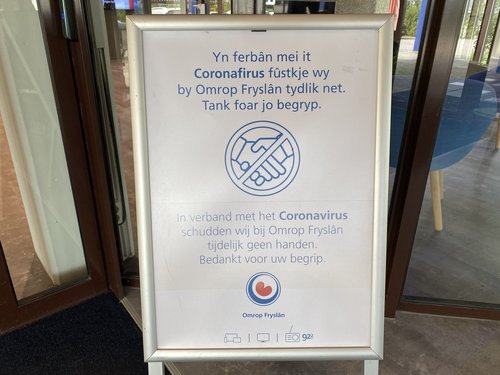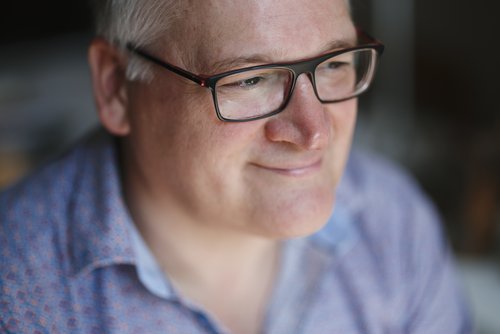Minority language media and the COVID-19 pandemic – the case of Frisian in the Netherlands: An Interview with Onno Falkena.




A series edited and conceptualised by Dr. Sergiusz Bober and Craig Willis.
* The text was updated on 5 October 2020. *
Returning to a non-kin state setting for our eighth interview in the ongoing series, Onno Falkena details the case of Frisian in the Netherlands. A seasoned journalist for regional public broadcaster Omrop Fryslân in the province of Fryslân / Friesland, Onno is well-positioned to provide first-hand experience of the situation during the lockdown months earlier this year. Focusing on the public broadcaster and other Frisian language media outlets, Onno provides a detailed overview of the situation for Frisian language media and the effects of COVID-19. This includes struggles with having local and national politicians and stakeholders communicating in Frisian instead of Dutch – despite ordinarily doing so – as well as the issue of reduced cultural content due to cancellations affecting traditional Spring and Summer cultural events. This post adds further examples of issues facing minority language media institutions across Europe and many parallels can be observed. Importantly, in practical terms Omrop Fryslân has adapted reasonably well to new working practices, something Onno outlines in detail below.
The interview commences with an overview including historical developments of Frisian language media, providing the reader with a contextual base from which COVID-19 related effects can be explored.
As an introduction, could you please summarise the minority language media (MLM) situation in your linguistic sphere?
Fryslân (or Friesland) is the only province of the Netherlands to have another official language, that of Frisian (also referred to as West Frisian) and is the only language in the Netherlands to be recognised under Part III of the European Charter for Regional and Minority Languages. Despite a wide understanding of the language amongst its 642,000 inhabitants, in Fryslân there is only a limited number of media outlets which publish or broadcast in the Frisian language.
Omrop Fryslân is the public broadcaster for Friesland. Omrop Fryslân broadcasts in Frisian and offers a daily news service on radio, television and the internet. Friesland has no public broadcaster in the Dutch language, but since some time Omrop Fryslân translates the news on its website and app in Dutch. Furthermore, Omrop Fryslân Radio is the most popular radio station (market leader) in Friesland. The broadcaster has a long history; the regional radio started shortly after WWII and the daily television broadcasts started in 1994, followed by an online service in 2000. Since 1988, every week a documentary (which is nowadays called FryslânDOK) is broadcast on the Dutch national channel NPO2 with Dutch subtitles. During the pandemic FryslânDOK invited interesting Frisian thinkers to deliver a speech (berchrede) about the world after COVID-19.
In addition, FryslânDOK also regularly makes programmes about minorities elsewhere in Europe. An example of this was the 2019 series ‘The grinzen fan Europa’ (The limits of Europe), about the complex relationship between linguistic minorities and the European Union. The three episodes portrayed the Roma community in Bulgaria, the Sami in Sweden and the Aranese minority in Catalunya. Furthermore, FryslânDOK also has a keen interest in the Frisian minorities in Germany and made several programmes and reports in Nordfraschlönj (Schleswig-Holstein) and Ostfriesland (Niedersachsen). An example is the 1999 documentary series ‘It oare Fryslân’ (The other Friesland).
In terms of other Frisian language media in Friesland, there is also a monthly magazine, called De Moanne (which is Frisian for moon and month), which mostly focuses on cultural issues and has not published much about COVID-19 yet. Apart from its monthly edition on paper which has 1,000 subscribers, De Moanne is also active on its website and social media. Another example is the Frisian news website www.itnijs.frl, which is an initiative of the Ried fan de Fryske Beweging (Council of the Frisian Movement), publishing written news and comments. In the past there was also a weekly in the Frisian language called ‘Frysk & Frij’. This weekly ceased to exist during the 1990s, when the provincial authorities decided to end its subsidy. Omrop Fryslân made a programme covering these developments, which is available on its archive-website.
Fryslân also has two daily newspapers, which both publish in the Dutch language. The amount of Frisian in the Leeuwarder Courant and Friesch Dagblad is limited, but both papers have a weekly page in Frisian. These pages are usually published in cultural supplements and most of the time deal with cultural affairs. Examples of interviews in Frisian can be seen in Friesch Dagblad and Leeuwarder Courant, both with Frisian writers in the very last phase of their life. Whilst the two newspapers also regularly use quotations in the Frisian language in Dutch language articles, all in all the amount of Frisian in both papers is seldom more than 3 to 5 percent. Economically the newspapers are not very healthy. This is particularly true for the Friesch Dagblad, the last protestant regional newspaper in the Netherlands. In the near future it is likely that both could be subject to a buyout by the large Flemish publishing house Mediahuis, the owner of the largest Dutch newspaper De Telegraaf. Contrary to the publicly funded Frisian broadcaster Omrop Fryslân, the two regional newspapers are privately-owned commercial endeavours. As such, like many regional papers all over Europe, Leeuwarder Courant and Friesch Dagblad have a hard time because of lower advertising revenues and a diminishing readership.
How has the COVID-19 pandemic affected the reporting of the MLM in your area and has there been any effect on readership / viewing figures?
Omrop Fryslân has been covering the COVID-19 pandemic and its consequences very intensively. An indispensable source of information is the regional health service GGD Fryslân, which is controlled by the Frisian municipalities. They provide the precise numbers of people tested (both negative and positive) and offer comprehensive advice about how to avoid COVID-19. However, on their website GGD Fryslân offers information in Dutch and English, but nothing in Frisian. When the pandemic started, the Director of GGD Fryslân Margreet de Graaf spoke to Omrop Fryslân in Frisian. However, on 11 March she suddenly switched to Dutch – using the argument ‘that everybody should be able to understand her words’. It Nijs wrote about this in the article titled “Frisian-speaking director of GGD does not want to speak Frisian anymore” Yet, later, when the critical point of the pandemic was over, Mrs de Graaf switched back to Frisian. It is interesting to notice that when the second wave of COVID-19 started mrs. De Graaf did not switch language again. Apparantly both GGD Fryslân and mrs. De Graaf feel comfortable now to speak Frisian to Omrop Fryslân.
In the spring the fact that Mrs. De Graaf switched to Dutch did not pass unnoticed. Several readers of website It Nijs readers’ reacted to this sudden change of language attitude – a few examples are worth quoting at length (translation in brackets):
Nuver. Wa’t nei OMFRY harket, ferstiet Frysk. Oars harkest der net nei. (Strange. Who listens to Omrop Fryslân, understands Frisian. Otherwise you don’t listen to it.)
Taaldiktatuer! Lykas yn Ruslân, kin net! (Language dictatorship! Like in Russia, unacceptable!)
Idioat dat se om in pear Antyfriezen nei it Nederlânsk oerskeakelet. Wy ha rjocht op ynformaasje yn ús eigen taal, al hielendal by ditsoarte wichtige saken! Ik wol elkenien opromme om by de GGD in klacht yn te tsjinjen, want dit liket nearne nei. Foar de Antyfriezen binne der genôch Nederlânske boarnen om it coronafirus te folgjen, mar foar ús is der gjin alternatyf. (Crazy to switch to Dutch because of a few Anti-Frisians. We are entitled to information in our own language, especially in such important matters! I am calling on everyone to file a complaint at GGD-Fryslân, because this is unacceptable. For Anti-Frisians there are many Dutch sources to follow the coronavirus, but we do not have any alternative.)
A similar thing occurred at Friesland’s largest hospital MCL in the Frisian capital of Ljouwert/ Leeuwarden. Spokesman Frits Mostert started informing the Frisians in Frisian, but later received orders from the management of the hospital to switch to Dutch. This is peculiar, because usually everybody who watches or listens to Omrop Fryslân understands the language. It is useful to mention the language policy of Omrop Fryslân here. It broadcasts in Frisian only, but leaves it up to the people its reporters interview to decide in which language they answer the questions. This frequently results in bilingual interviews. This means that the reporter speaks Frisian and the interviewee answers in Dutch. This is possible because according to a recent survey 93.1 % of all people living in Friesland understand the language. The percentage of people being able to speak Frisian is lower: 64 %.
In terms of linguistic terminology, Corona being a ‘new’ illness, it was also a small challenge for Frisian reporters how to write and pronounce COVID-19: corona, korona or koroana? Here the Fryske Akademy (established in 1938, this scientific institute focuses on the Frisian language and culture) helped by publishing a short wordlist with some linguistic advice. This was a logical step given that the institute publishes Frisian dictionaries – based on a huge scientific dictionary for Frisian – and also provides all sorts of linguistic support at a dedicated website. In terms of media institutions’ decisions on this, It Nijs.frl immediately adopted koroana, but Omrop Fryslân decided to stick to ‘corona’, because of the familiarity of the term. The Fryske Akademy stated that ‘corona’ was acceptable as well.
In the Spring there was a remarkable increase in the viewing and readership of Omrop Fryslân. For some time Omrop Fryslân also embedded the weekly press conferences of Dutch PM Mark Rutte in its radio and TV programmes, followed by comments of its own journalists and Frisian leaders such as mayor Sybrand Buma of the Frisian capital (also president of GGD Fryslân), Frisian entrepreneurs, and the CEO of the regional public transport operator Arriva Anne Hettinga, who is a Frisian speaker. The angle always was: what do the new measures and rules mean for Friesland and the Frisian society, and how do Frisians feel about this? Like in all programmes of Omrop Fryslân; people are invited to give their comment in the language they prefer. It goes without saying that Omrop Fryslân encourages people who are fluent in Frisian to speak Frisian.
How has the lockdown / social distancing measures affected other covered content in MLM?
Omrop Fryslân has a very strong tradition of covering Frisian traditional events during the summer such as Skûtsjesile (two sailing competitions with traditional Frisian ships), outdoors handball (keatse) and several cultural events as well. This was hardly possible this year, because most events were cancelled due to COVID-19 measures. This required quite a bit of creativity. For example, Omrop Fryslân still managed to produce and broadcast a programme ‘Simmer yn Fryslân’ about activities in Frisian villages during the strange summer of 2020.
On the other hand, Omrop Fryslân invested more time and human resources in the news programmes, regularly offering extra content and updates, when there was a reason to do so. Omrop Fryslân also regularly broadcast video diaries from nurses, doctors and other people dealing with or affected by COVID-19. Through its website, Omrop Fryslân built a dossier offering all relevant information about the coronavirus, including the latest figures about the number of Frisians affected in every municipality.
How has MLM covered issues of majority-minority relations and has the situation or voice of minorities been covered in majority media?
During the development of the pandemic it became clear that the Frisian language was pretty much overlooked by the authorities, being too busy with other matters. In the beginning even the most practical advice about how to avoid COVID-19 was not available in Frisian. At the end of April, the Frisian provincial government therefore decided to design posters with this advice in Frisian and in all local languages spoken in Friesland such as Bilts, urban Frisian, languages of the Frisian islands and Stellingwarfs, which is a variety of Low-Saxon, spoken in the south of Friesland. The Province was stimulated to do this by the Network to Promote Linguistic Diversity in Europe (NPLD). In some places in Friesland the posters in local languages with advice such as washing hands and keeping distance were widely distributed – this was reported on by the language umbrella organisation EBLT. Later also several municipalities in Friesland started to communicate their advice about COVID-19 bilingually or even trilingually. In the last case the third language was English and meant to address tourists.
In times of crisis, such as the pandemic, the so-called Veiligheidsregio’s (‘safety regions’), play a central role in the Netherlands. Organisations such as fire brigades and the aforementioned GGD Fryslân are all part of Veiligheidsregio Fryslân, covering the whole province. Its board consists of the mayors of all Friesland’s municipalities. Moreover, it has a great deal of power to take all kinds of measures such as closing cafes, restaurants or parks, forbidding events, etc. However, this is a problem because the Veiligheidsregio’s lack an elected or representative body to control these decisions. Unlike in most other European countries, in the Netherlands Mayors are not elected by the people, but nominated by the municipality, and, in the end appointed by the King. Several members of the municipality of Ljouwert/Leeuwarden are very critical about ‘undemocratic’ decision making by the Veiligheidsregio and have scheduled a debate about the issue with the Mayor.
The Veiligheidsregio Fryslân apparently does not have a language policy. However, this does not mean that Frisian is not used by this authority at all. Spokesman Marcel de Jong frequently informed Omrop Fryslân in Frisian, also during a local outbreak of COVID-19, and the same can be said about director Wim Kleinhuis of the Frisian Veiligheidsregio. But there is a big difference between oral and written usage of Frisian. Spoken Frisian may be frequent, but several official bodies in Friesland still hardly use written Frisian. This is clearly visible on the website of the Veiligheidsregio Fryslân. Until now Frisian language organisations have been reluctant to criticise both Veiligheidsregio and GGD Fryslân about the absence of language policy, knowing that they are quite busy testing people and dealing with COVID-19.
At the same time, COVID-19 has never become a real epidemic in Friesland itself and the region is ranked among the 25 safest in Europe. Indeed, during the Spring the intensive care units of several Frisian hospitals were full with patients from other parts of the Netherlands. During the summer there were a few local outbreaks in the northernmost city of Dokkum and on the island of Skylge/Terschelling, which passed relatively fast. In the latter case, only young tourists tested positive, and indeed Omrop Fryslân reported about these local outbreaks.
However, the situation changed rapidly for the worse in the month of september. With more than 500 positive cases during one week, the situation in Friesland is considered to be ‘worrying’. Wearing masks is now obligatory in public places, and everybody – journalists included – are again encouraged to work at home and to visit the workplace only when this is considered necessary.
In what way has the pandemic affected MLM practitioners’ day to day work and have there been any future implications discussed?
In the Spring, the staff of Omrop Fryslân was split in two sections; people working outside and people working in the newsroom. The reporters outside covered stories all over Friesland, without ever going back to the newsroom. The reporters put their microphone on a long stick to keep some distance and interviewed people as much as possible outdoors. Journalists and cameramen travelled in separate cars in order to avoid infection. Several radio presenters also started to present their programme from home. With a good internet connection and online access to the newsroom programmes, this is a feasible way of working which may even be applied more often in the future.
The strategy worked pretty well. Video, audio and written stories were transmitted or uploaded to the newsroom and all meetings were online, with this situation lasting from March to June. At that point the height of the ‘first wave’ was over and reporters were welcome again in the building of Omrop Fryslân; but working at home, at different locations or even in cars has become rather normal for some reporters. For example, Johanna Brinkman even detailed how she managed to continue working during the pandemic. In addition, in terms of infections the strategy also worked well. Quite a few journalists of Omrop Fryslân were tested, but until now only three tested positive – all of them quite young and not very ill.
The wider implications of the pandemic are being discussed all the time. With few cases in Friesland compared to other regions of the Netherlands many Frisians ask themselves why they still live with so many restrictions and so many practical and economic problems because of that. Cultural organisations in particular are struggling to survive; in summertime Friesland usually has lots of festivals, summer fairs and open-air theatres in the Frisian language, yet in the strange summer of 2020 very few events took place. Still, Frisian theatre company Tryater managed to keep busy in the ‘new normal’. In June there was a full theatre week online, and at present Tryater organizes theatrical walks, which can be enjoyed individually. These walks are called ‘It gelok fan Fryslân’ (The happiness of Friesland).
However, in September the number of infected people in Friesland augmented rapidly from 37 new cases in week 37 to a record of 513 confirmed cases in week 40. This means that, if we like it or not, COVID-19 will be part of our lives for some time and that we must learn to cope with it, at least for the time being.
About the author:
Onno Falkena is a political reporter at Omrop Fryslân and an expert in the field of Frisian and other minority languages. In 2019, he made a series of FryslânDOK-documentaries about the complicated relationship between the linguistic minorities in Europe and the European Union, called ‘De grinzen fan Europa’ (‘The limits of Europe’).



Commentaries
If you wish to write a commentary on this interview, please contact the editors Dr. Sergiusz Bober and Craig Willis.

